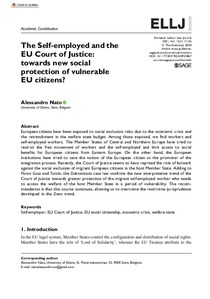The self-employed and the EU Court of Justice: towards new social protection of vulnerable EU citizens?

2021
12
1
March
17-36
self employed ; economic recession ; welfare state ; EU Court of Justice ; European citizenship ; case law
Employment
https://doi.org/10.1177/2031952520953867
English
Bibliogr.
"European citizens have been exposed to social exclusion risks due to the economic crisis and the retrenchment in the welfare state budget. Among those exposed, we find workers and self-employed workers. The Member States of Central and Northern Europe have tried to restrict the free movement of workers and the self-employed and limit access to social benefits for European citizens from Eastern Europe. On the other hand, the European institutions have tried to save the notion of the European citizen as the promoter of the integration process. Recently, the Court of Justice seems to have reprised the role of bulwark against the social exclusion of migrant European citizens in the host Member State. Adding to Florea Gusa and Tarola, the Dakneviciute case law confirms the new interpretative trend of the Court of Justice towards greater protection of the migrant self-employed worker who needs to access the welfare of the host Member State in a period of vulnerability. The recommendation is that this course continues, allowing us to overcome the restrictive jurisprudence developed in the Dano trend."
Digital
The ETUI is co-funded by the European Union. Views and opinions expressed are however those of the author(s) only and do not necessarily reflect those of the European Union or the ETUI.